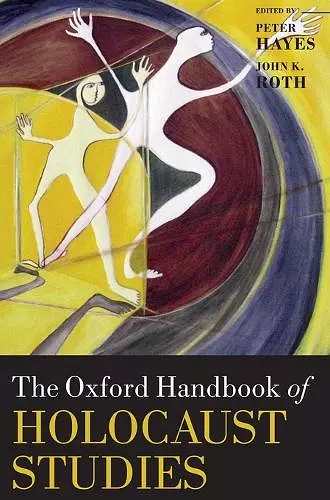The Oxford Handbook of Holocaust Studies
Peter Hayes editor John K Roth editor
Format:Hardback
Publisher:Oxford University Press
Published:25th Nov '10
Currently unavailable, and unfortunately no date known when it will be back
This hardback is available in another edition too:
- Paperback£34.99(9780199668823)

Few scholarly fields have developed in recent decades as rapidly and vigorously as Holocaust Studies. At the start of the twenty-first century, the persecution and murder perpetrated by the Nazi regime have become the subjects of an enormous literature in multiple academic disciplines and a touchstone of public and intellectual discourse in such diverse fields as politics, ethics and religion. Forward-looking and multi-disciplinary, this handbook draws on the work of an international team of forty-seven outstanding scholars. The handbook is thematically divided into five broad sections. Part One, Enablers, concentrates on the broad and necessary contextual conditions for the Holocaust. Part Two, Protagonists, concentrates on the principal persons and groups involved in the Holocaust and attempts to disaggregate the conventional interpretive categories of perpetrator, victim, and bystander. It examines the agency of the Nazi leaders and killers and of those involved in resisting and surviving the assault. Part Three, Settings, concentrates on the particular places, sites, and physical circumstances where the actions of the Holocaust's protagonists and the forms of persecution were literally grounded. Part Four, Representations, engages complex questions about how the Holocaust can and should be grasped and what meaning or lack of meaning might be attributed to events through historical analysis, interpretation of texts, artistic creation and criticism, and philosophical and religious reflection. Part Five, Aftereffects, explores the Holocaust's impact on politics and ethics, education and religion, national identities and international relations, the prospects for genocide prevention, and the defense of human rights.
What the book brings instead are useful, intelligent, judicious, and lucidly written summaries of the current scholarly consensus on key issues within the field. The ideal user- I deliberately say user and not reader-is a scholar of some related field, who, for purposes of research or teaching, needs to get a grasp on a particular aspect of the Holocaust without having to master a large body of secondary literature. * Andrew N. Koss Religious Studies Review *
a pioneering achievement which sets the standard for future such handbooks by capturing the current major debates of the field in an incisive and insightful way. * K. Hannah Holtschneider, Expository Times *
To capture the current state of the field, the editors invited contributions from Holocaust scholars of the second and third generations - a decision that pays off handsomely ... It should be purchased by every university library in institutions where courses on the Holocaust are taught. * Donald G. Schilling, Holocaust and Genocide Studies *
an excellent reference work and more. It contains broad implications for the understanding of genocide as such while emphasizing the Holocausts uniqueness. As important, however, is the Handbooks broad thematic and interdisciplinary approach, which encourages all Holocaust scholars to rethink constantly the paradigmatic and disciplinary barriers that tend to compartmentalize the academic world more generally. * Norman J.W. Goda, Journal of Contemporary History *
ISBN: 9780199211869
Dimensions: 253mm x 176mm x 47mm
Weight: 1676g
792 pages